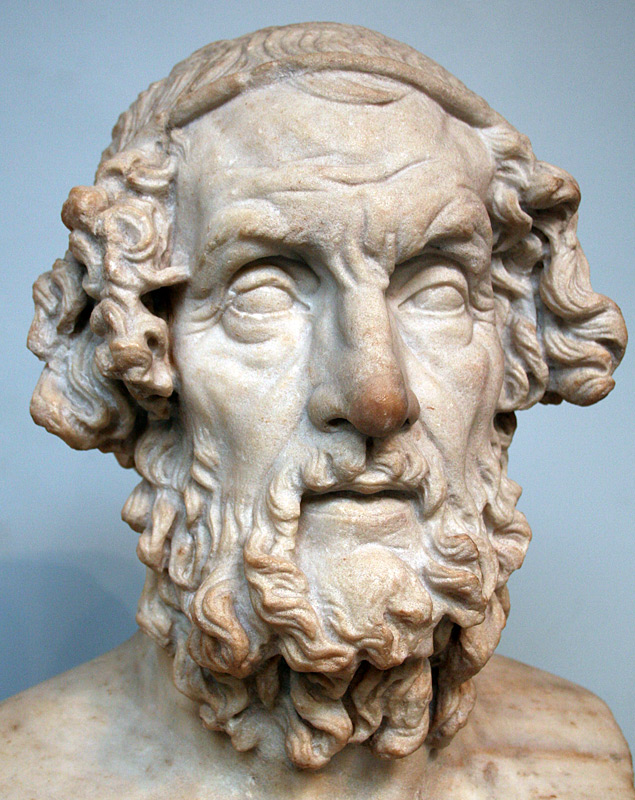Homér Quotes
“Iron has powers to draw a man to ruin.”
XIX. 13 (tr. Robert Fagles); Odysseus to Telemachus.
Odyssey (c. 725 BC)
“It is the god who accomplishes all things.”
XIX. 90 (tr. R. Lattimore).
Iliad (c. 750 BC)
XXI. 110 (tr. R. Lattimore); spoken by Achilles.
Iliad (c. 750 BC)
XV. 392–394 (tr. Alexander Pope).
Odyssey (c. 725 BC)
“The time for trusting women's gone forever!”
XI. 456 (tr. Robert Fagles).
Alexander Pope's translation:
: For since of womankind so few are just,
Think all are false, nor even the faithful trust.
Odyssey (c. 725 BC)
XIII. 730–733 (tr. Alexander Pope).
Iliad (c. 750 BC)
“Victory passes back and forth between men.”
VI. 339 (tr. R. Lattimore); Paris contemplates the fickleness of victory as he prepares to go into battle.
Iliad (c. 750 BC)
“Life and death are balanced as it were on the edge of a razor.”
X. 173–174 (tr. Samuel Butler).
Iliad (c. 750 BC)
IX. 34–36 (tr. Robert Fagles).
Odyssey (c. 725 BC)
“In form of Stentor of the brazen voice,
Whose shout was as the shout of fifty men.”
V. 785–786 (tr. Lord Derby).
Iliad (c. 750 BC)
“Welcome words on their lips, and murder in their hearts.”
XVII. 66 (tr. Robert Fagles).
Odyssey (c. 725 BC)
“But the gods give to mortals not everything at the same time.”
IV. 320 (tr. R. Lattimore).
Iliad (c. 750 BC)
“My soul
Shall bear that also; for, by practice taught,
I have learned patience, having much endured.”
V. 222–223 (tr. William Cowper).
Odyssey (c. 725 BC)
“Now sure enough the vile man leads the vile!
As ever, god brings like and like together!”
XVII. 217–218 (tr. G. H. Palmer).
Odyssey (c. 725 BC)
IV. 442–443 (tr. R. Lattimore).
Iliad (c. 750 BC)
“Once a thing has been done, the fool sees it.”
XVII. 32 (tr. R. Lattimore).
Iliad (c. 750 BC)
“Sweet oblivion, sleep
dissolving all, the good and the bad, once it seals our eyes.”
XX. 85–86 (tr. Robert Fagles).
Odyssey (c. 725 BC)
“If I hold out here and I lay siege to Troy,
my journey home is gone, but my glory never dies.”
IX. 413 (tr. Robert Fagles); spoken by Achilles.
Iliad (c. 750 BC)
XV. 398–401 (tr. Alexander Pope).
E. V. Rieu's translation:
: Meanwhile let us two, here in the hut, over our food and wine, regale ourselves with the unhappy memories that each can recall. For a man who has been through bitter experiences and travelled far can enjoy even his sufferings after a time.
Odyssey (c. 725 BC)
“Helios, Sun above us, you who see all, hear all things!”
III. 277 (tr. Robert Fagles).
Iliad (c. 750 BC)
“Jove weighs affairs of earth in dubious scales,
And the good suffers, while the bad prevails.”
VI. 188 (tr. Alexander Pope).
Odyssey (c. 725 BC)
XV. 19–23 (tr. Samuel Butler).
Odyssey (c. 725 BC)
XVII. 446–447 (tr. R. Lattimore); Zeus.
Robert Fagles's translation:
: There is nothing alive more agonized than man
of all that breathe and crawl across the earth.
Iliad (c. 750 BC)
“We two have secret signs,
known to us both but hidden from the world.”
XXIII. 109–110 (tr. Robert Fagles).
Odyssey (c. 725 BC)
“I'll fling a spear myself and leave the rest to Zeus.”
XVII. 515 (tr. Robert Fagles).
Iliad (c. 750 BC)
“See now, how men lay blame upon us gods for what is after all nothing but their own folly.”
I. 32–34 (tr. Samuel Butler).
Odyssey (c. 725 BC)
“Who, on his own,
has ever really known who gave him life?”
I. 216 (tr. Robert Fagles).
Odyssey (c. 725 BC)
“He in the turning dust lay
mightily in his might, his horsemanship all forgotten.”
XVI. 775–776 (tr. R. Lattimore).
Iliad (c. 750 BC)
“He will tell you no lies, for he is an excellent person.”
III. 328 (tr. Samuel Butler).
Odyssey (c. 725 BC)
“The proof of battle is action, proof of words, debate.”
XVI. 630 (tr. Robert Fagles).
Iliad (c. 750 BC)
“The fleeting shadows of the dead.”
X. 521 (tr. G. A. Schomberg).
Odyssey (c. 725 BC)
“The gods don't hand out all their gifts at once,
not build and brains and flowing speech to all.”
VIII. 167–168 (tr. Robert Fagles).
Odyssey (c. 725 BC)
XVI. 190–191 (tr. Samuel Butler).
Odyssey (c. 725 BC)
VIII. 221–222 (tr. Samuel Butler).
Odyssey (c. 725 BC)
I. 58–59 (tr. Robert Fitzgerald).
Odyssey (c. 725 BC)
“If indeed there be a god in heaven.”
XVII. 484 (tr. S. H. Butcher and Andrew Lang).
Odyssey (c. 725 BC)
XII. 322–328 (tr. R. Lattimore); Sarpedon to Glaukos.
Iliad (c. 750 BC)
“Hardship can age a person overnight.”
XIX. 360 (tr. Robert Fagles).
Odyssey (c. 725 BC)
“It's light work for the gods who rule the skies
to exalt a mortal man or bring him low.”
XVI. 211–212 (tr. Robert Fagles).
Odyssey (c. 725 BC)
“There she encountered Sleep, the brother of Death.”
XIV. 231 (tr. R. Lattimore).
Iliad (c. 750 BC)
VI. 180–185 (tr. Robert Fitzgerald); Odysseus to Nausicaa.
Odyssey (c. 725 BC)
I. 1–5 (tr. Robert Fagles).
Odyssey (c. 725 BC)
